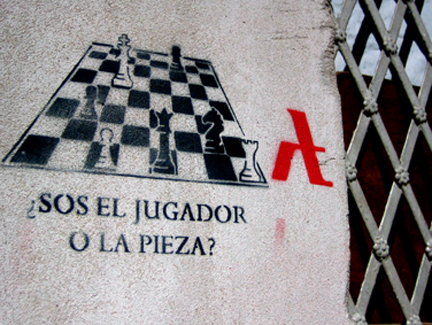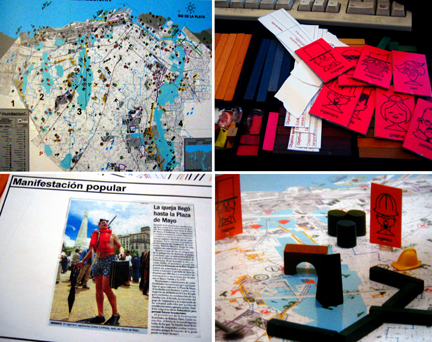‘Un-walling the High Modernist Living Room’ and other architectural strategies of m7red
m7red, also identifiable as Mauricio Corbalan and Pio Torroja, work, live and play in a motel-like space on the top floor of an apartment block in the Montserrat district. The aesthetic reminds of me of both Raumlabor and Beacon Street - colourful, multi-functional furniture installations, odd assortments of lights rigged up in an ad-hoc fashion, boxes of nails stored on bookshelves in the bathroom along with political philosophy and porn. Studios, bedrooms, kitchen and bathroom all spill onto an open walkway which boasts an Atelier van Lieshout-esque shower capsule with views over the city and a bathtub filled with thick, dark green water. If you swill it around with the small crabbing net you can actually find some functioning goldfish.
I have an ‘office’ all to myself, a room with high ceilings lined with copies of Architectural Design from the sixties and seventies, an inheritance from a friend’s father. Pio found me one from 1968. The title is ‘Architecture and Democracy’, and it is filled with articles on subjects like squatter settlements, prefab housing and the shifting role of architects. I have spent three afternoons there thus far, browsing the literature they keep pulling off shelves and slowly translating the ‘rules’ of Flood. This is the game that they have been developing over the past few years and which I will work on while I’m here.
Most of their work revolves around creating dialogue structures about urban issues, as a kind of architecture in itself. They potentially differ from other groups this year in that the conversations these generate are viewed as an end in themselves, rather than in service of a specific material outcome. In their own words…. "we work on the implementation of urban political scenarios where everyone can become a decision making agent in the city” and “with the development of architecture which includes social relations and the architecture of groups and networks." They like swarm systems, pop culture and barter practices, as well as how the term ‘architecture’ has been lifted to describe strategic techniques in so many other disciplines. They are also blog addicts. They currently have four in fact: m7explorer, decorama, chat-theater and a photoblog with the same title as this blog post (“unwalling” is apparently an Israeli military term that refers to entering a property by blowing a hole in the wall in order to avoid booby traps around doors and windows)…..and we might develop yet another for Flood!
There are plenty of people around tinkering with similar subjects, but the interest for me is in how their position has been shaped by the political framework of Argentina. “Let’s organise ourselves, the State has left”....grafitti that could be found even in the middle class suburbs after the economic crash of 2001. For them the ‘crisis’, as it is commonly referred to here, was an important catalyst for their work. Collaborative networks exist out of a certain kind of necessity perhaps, rather than because of a trendy fetishisation of all things ‘collective’. For example, an artist-centred barter system they were involved in, Proyecto Venus, actually became an officially recognised informal currency during a six month state of emergency. While Mauricio contrasts the Argentine ‘weak’ State with the powerful sense of the State in Europe (they have done some work in ‘bureaucratic’ Holland as well as with Raumlabor, whose projects are often funded by cultural government organisations), it might not be so far from the post-Katrina atmosphere of neighbourhood organising in New Orleans, which followed widespread disillusionment with the US government response at all levels.

This context is the springboard for their Flood! game, “a de-nationalising of the flood control system”. Their goal is not necessarily to propose an outright alternative to the disaster response system for floods in Buenos Aires. Rather they use the circumstances of a flood, which so dramatically and rapidly changes the nature and relationships of the city, in the context of a game, to generate conversations amongst a wide range of people about new urban possibilities. The key is that you play another character than yourself, encouraging players to think about the city from a different perspective. The game has been through a few iterations, depending on where it has been played – so far, Argentina and Madrid and next, Costa Rica in December. It originally started off as a straightforward website inviting ideas on how the city should cope in times of flooding, the suggestions from which (serious, humorous and fantastical) became the basis of its development into a game.

Like all the people I’ve visited this year, it is always interesting to hear what kind of vocabulary they use. Mauricio explained how they think in terms of creating ‘public time’ rather than (or as a form of) ‘public space’….and of investigating ‘urbanity’ rather than ‘urbanism’. Their references range from books edited by Newt Gringich on conservative strategy-planning, to anarchist handbooks and collaborations with Dungeons and Dragons gaming experts!
So far I have no idea how they fund themselves. I haven´t yet asked.
Meanwhile……..unable to spend any more time reading books in restaurants I ended up in a double theatre/cinema bill this evening – a theatre performance entitled ‘La Cuna Vacia’ (the Empty Cot), which dealt with the military era of the seventies and the ‘disappeared’. Dramatic lighting, haunting music and beautiful visual effects were only upset by my recently purchased four-peso alarm clock, which started to beep loudly and cheaply in the middle of a sensitive moment. Afterwards I went straight into the cinema next door to see Matchpoint, which had been recommended by Pio. Because I am out of the loop as usual on most things cultural and current I only realised then that it was the recent Woody Allen film and that it’s all set in London. Very strange to watch such familiar scenery, social interactions and lifestyles in Buenos Aires. If you haven’t seen it, go tomorrow, it’s excellent.
Meanwhile downstairs at 4 in the morning the cheesy disco beats at the ViaVia hostel are still thumping. It’s time to ramp up the search for my own apartment.
Mi español está mejorando.
I have an ‘office’ all to myself, a room with high ceilings lined with copies of Architectural Design from the sixties and seventies, an inheritance from a friend’s father. Pio found me one from 1968. The title is ‘Architecture and Democracy’, and it is filled with articles on subjects like squatter settlements, prefab housing and the shifting role of architects. I have spent three afternoons there thus far, browsing the literature they keep pulling off shelves and slowly translating the ‘rules’ of Flood. This is the game that they have been developing over the past few years and which I will work on while I’m here.
Most of their work revolves around creating dialogue structures about urban issues, as a kind of architecture in itself. They potentially differ from other groups this year in that the conversations these generate are viewed as an end in themselves, rather than in service of a specific material outcome. In their own words…. "we work on the implementation of urban political scenarios where everyone can become a decision making agent in the city” and “with the development of architecture which includes social relations and the architecture of groups and networks." They like swarm systems, pop culture and barter practices, as well as how the term ‘architecture’ has been lifted to describe strategic techniques in so many other disciplines. They are also blog addicts. They currently have four in fact: m7explorer, decorama, chat-theater and a photoblog with the same title as this blog post (“unwalling” is apparently an Israeli military term that refers to entering a property by blowing a hole in the wall in order to avoid booby traps around doors and windows)…..and we might develop yet another for Flood!
There are plenty of people around tinkering with similar subjects, but the interest for me is in how their position has been shaped by the political framework of Argentina. “Let’s organise ourselves, the State has left”....grafitti that could be found even in the middle class suburbs after the economic crash of 2001. For them the ‘crisis’, as it is commonly referred to here, was an important catalyst for their work. Collaborative networks exist out of a certain kind of necessity perhaps, rather than because of a trendy fetishisation of all things ‘collective’. For example, an artist-centred barter system they were involved in, Proyecto Venus, actually became an officially recognised informal currency during a six month state of emergency. While Mauricio contrasts the Argentine ‘weak’ State with the powerful sense of the State in Europe (they have done some work in ‘bureaucratic’ Holland as well as with Raumlabor, whose projects are often funded by cultural government organisations), it might not be so far from the post-Katrina atmosphere of neighbourhood organising in New Orleans, which followed widespread disillusionment with the US government response at all levels.

This context is the springboard for their Flood! game, “a de-nationalising of the flood control system”. Their goal is not necessarily to propose an outright alternative to the disaster response system for floods in Buenos Aires. Rather they use the circumstances of a flood, which so dramatically and rapidly changes the nature and relationships of the city, in the context of a game, to generate conversations amongst a wide range of people about new urban possibilities. The key is that you play another character than yourself, encouraging players to think about the city from a different perspective. The game has been through a few iterations, depending on where it has been played – so far, Argentina and Madrid and next, Costa Rica in December. It originally started off as a straightforward website inviting ideas on how the city should cope in times of flooding, the suggestions from which (serious, humorous and fantastical) became the basis of its development into a game.

Like all the people I’ve visited this year, it is always interesting to hear what kind of vocabulary they use. Mauricio explained how they think in terms of creating ‘public time’ rather than (or as a form of) ‘public space’….and of investigating ‘urbanity’ rather than ‘urbanism’. Their references range from books edited by Newt Gringich on conservative strategy-planning, to anarchist handbooks and collaborations with Dungeons and Dragons gaming experts!
So far I have no idea how they fund themselves. I haven´t yet asked.
Meanwhile……..unable to spend any more time reading books in restaurants I ended up in a double theatre/cinema bill this evening – a theatre performance entitled ‘La Cuna Vacia’ (the Empty Cot), which dealt with the military era of the seventies and the ‘disappeared’. Dramatic lighting, haunting music and beautiful visual effects were only upset by my recently purchased four-peso alarm clock, which started to beep loudly and cheaply in the middle of a sensitive moment. Afterwards I went straight into the cinema next door to see Matchpoint, which had been recommended by Pio. Because I am out of the loop as usual on most things cultural and current I only realised then that it was the recent Woody Allen film and that it’s all set in London. Very strange to watch such familiar scenery, social interactions and lifestyles in Buenos Aires. If you haven’t seen it, go tomorrow, it’s excellent.
Meanwhile downstairs at 4 in the morning the cheesy disco beats at the ViaVia hostel are still thumping. It’s time to ramp up the search for my own apartment.
Mi español está mejorando.
» Post a Comment